By Brittani, Carmen, Daniela, Gabby, Katrina, Mey, and Whitney
Sometimes it’s nice to feel like you exist.
Over a year ago, Katrina, Gabby, Brittani, Carmen, and Whitney were on the first-ever Queer Women of Color A-Camp Panel, and the last two times we headed up the mountain we sent y’all stories from deep within our hearts to try to give you bits and pieces of our lives and experiences as queer women of diverse ethnic and racial makeup who find a commonality with each other right there in that kind of space, in that element. Since that, we’ve grown in numbers and changed the format of the panel – and this year we’re taking a completely new spin by exploring our history and our unique perspectives in a more academic and theoretical way.
This time we’re leaving you with ten new role models of color who have made massive and amazing contributions to this world. The bonus? Most of them are queer as fuck.
Alicia Anabel Santos
by Gabby
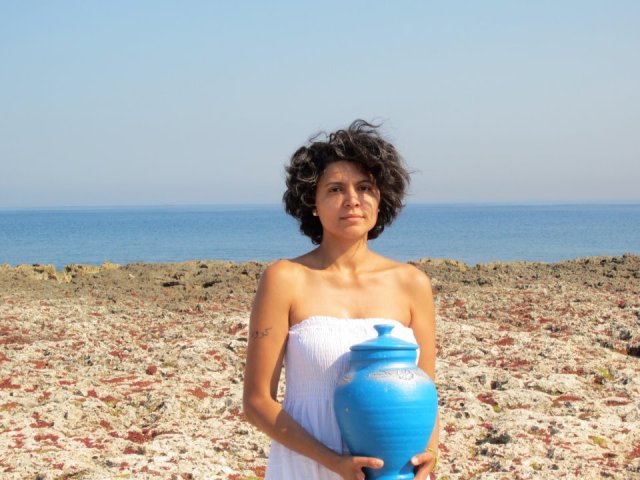
I first met Alicia when she was actively heading the New York City Latina Writer’s Group. They put a post up on their FB page inviting all LW to an apartment in Harlem for a free write session. So I went, it was brick ass cold outside and I was by myself and regretting my decision until the moment Alicia greeted me at her door. Why am I telling you about my friend? Yo, because she’s amazing and we didn’t start as friends. We just met and she was everything I’d ever wanted to meet in another person. Alicia wrote and co-produced the international documentary AfroLatinos: The Untaught Story which focuses on:
…the estimated 150 million invisible afrodescendants currently living in Latin America. Afrolatinos is a seven part series in English and Spanish, that shows the rich culture and shares the contributions of the enslaved Africans who arrived to the Caribbean, Central and South America. This history is seldom told or often omitted when talking about these regions of the world.
Creador Productions is currently running a campaign for more funding. Alicia is also a spoken word poet, educator, and author of Finding Your Force: A Journey to Love. She is so many things. That night she hung up my coat, warmed me up with some badass Dominican coffee and treated me like a sister, a person, a fellow Latin@. No judgement. No bullshit. We created art, shared our stories and now I get to be friends with someone traveling the globe to promote community and the history of our people. Chill with Alicia for like five seconds and you’ll feel invincible and loved. Experience her art work, her movement and you’ll be praising the santos for Alicia.
Alma López
by Mey
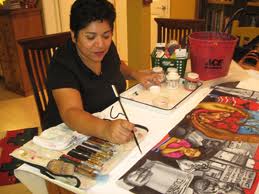
Alma López uses her art to reclaim images that are often associated with oppression of Latin@s and show how they can be symbols of feminism, queerness and indigenous pride. She’s a Chicana artist who was born in Los Mochis, Mexico and raised in Los Angeles. Her digital work, murals and other art focus mainly on interpreting iconic symbols from Chicana life, such as Lotería, luchadores, la Llorona and especially the Virgen de Guadalupe through feminist and queer lenses. She also has made several murals with the goal of bringing together black and Latino communities through shared struggles for human and civil rights.
Her art isn’t only beautiful and powerful, it also is a form of activism and resistance. Her 2001 digital collage Our Lady created a huge controversy when it was first displayed in New Mexico and religious groups protested it’s “blasphemous and impure depiction of ‘Our Lady’.” This protest, and the threats of violence that came with it, followed Alma López whenever the image was displayed for the next 10 years across multiple states and countries. But she refused to back down, standing by the importance of showing this iconic symbol that many see as an emblem of colonial religion in a way that makes a symbol of Chicana and female strength. In this way, Latinas who might feel alienated from parts of their culture due to their queerness or feminist ideals are able to find new common ground with their culture. Through her art, she makes me proud to be Latina, a woman and queer.
Andrea Hairston
by Brittani
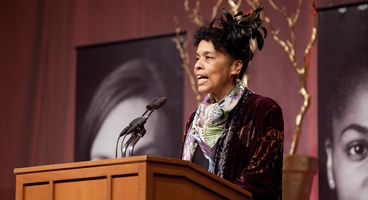
I feel like this is a fourth-grade history assignment and so why not just roll with that vibe. I think it works well for Andrea Hairston since just straight up laundry-listing her day-to-day will be enough to look into her work. Hairston is a queer African-American woman from Pittsburgh. She graduated from Smith and got her even-higher learning on at Brown. Like most badasses, she can’t limit herself to one thing so in addition to being an accomplished sci-fi and fantasy novelist, she’s a teacher, poet, musician, director, actress, and playwright. Hairston also co-founded Chrysalis Theatre Company, a social action theater group of which she is the Artistic Director. Her debut novel, Mindscape, won the Carl Brandon Parallax Award and her 2011 release, Redwood and Wildfire, won The James Tiptree, Jr. Award for exploring one’s understanding of gender in the sci-fi or fantasy genre. She was the WisCon (a feminist sci-fin convention) Guest of Honor in 2012.
Eve Oishi
by Whitney
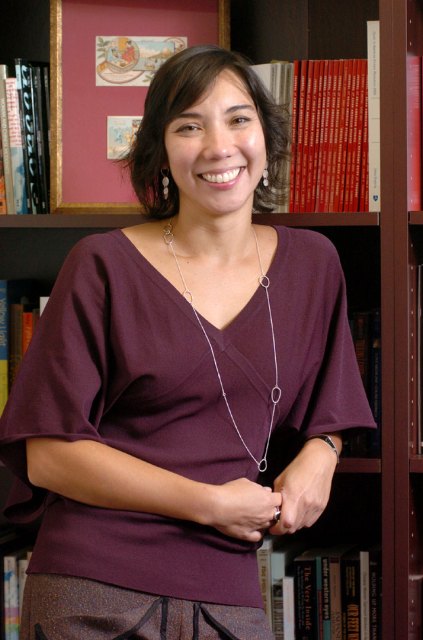
Eve Oishi is a “bad Asian‚” as in badass. She wrote an essay titled “Bad Asians: New Film and Video by Queer Asian American Artists” that blew my mind when I first read it in college:
“I … explain my theory about Good and Bad Asians. Good Asians embody the images and behaviors prescribed to them by white society. They are conservative and quiet supporters of the status quo. Good Asians don’t hang out at pool halls. There is a white-supremacist fiction that Asian-Americans are overwhelmingly interested in something called ‘saving face’ and therefore will not do anything to call undue attention to themselves or their communities. Therefore, any Asian American who makes noise, acts nasty, or in any way flouts the expectations of racist stereotype is a Bad Asian. Bad as in ‘badass.’ Bad as in anyone who does not covet white patriarchal approval; anyone who challenges racism, class oppression, sexism, homophobia; anyone who talks candidly about sex and desire.”
Oishi identifies as a lesbian and is a scholar and professor who writes unflinchingly about race, sexuality and queer identity in a way that has challenged me to think of myself as a political, powerful individual and Asian, in the best way the word can be re-appropriated to create identity rather than stiflingly define it. I was called a ‚”bad Asian” in high school for loving to write; I was called a “banana” (white on the inside, yellow on the outside) for playing guitar instead of being in the orchestra. It defined who I had to be, not who I wanted to be, and Oishi has taken the phrase, turned it around, and made it into something powerful, meaningful.
I am proud to be a bad Asian.
Fallon Fox
by Mey
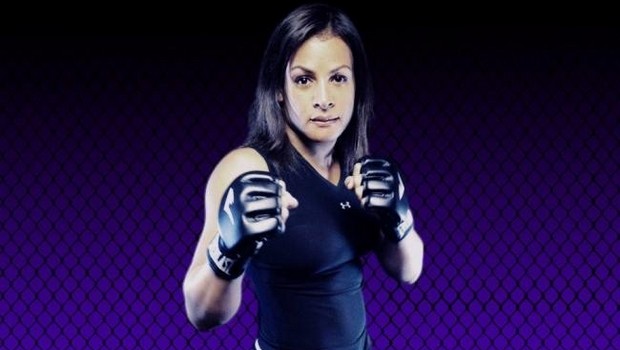
Fallon Fox kicks ass in more than one way. The first openly transgender woman fighting in MMA, she has shown how to be a trailblazer with ultimate poise. Since coming out, she’s had to deal with a constant barrage of insults, transphobia and psuedo-science from media personalities, fans of mixed martial arts and her fellow fighters. Through all of this, she’s maintained a 5-0 record (amateur and professional) and continues to get better and better at her sport. She works hard, trains hard and fights harder. Even though her critics keep misgendering her, dehumanizing her and spewing insults at her that range from “liar” to “freak” to “woman beater” she has been able to stay calm and explain to them just exactly how they are being wrong and insulting.
While Jason Collins has been largely celebrated for coming out as a gay man in the NBA, Fallon Fox has not had the same luck. Critics keep on saying that she shouldn’t be fighting against “real” women, yet she refuses to allow them to take her womanhood away from her. It’s true that trans women are starting to be more and more accepted in entertainment and the arts, in politics and even in schools, but her example shows just how hard it is for us to be accepted everywhere. Yes, she has tremendous physical strength, but she is also one of the strongest women I’ve ever seen when it comes to courage and character. That courage to follow her dreams and be true to herself is what makes her truly badass.
Gloria Anzaldúa
by Katrina
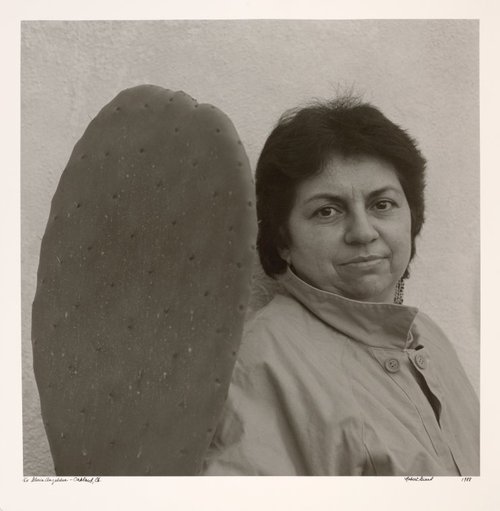
In my adult life thus far, I don’t think I’ve ever encountered anything simultaneously so liberating and so oppressive as the academy. On the one hand, its language frees expression – step into a social science classroom or open up a textbook, and before your eyes you will find a seemingly boundless abundance of language to express your body, your mind, your experiences. Suddenly, there are names for those ever-present anxieties that pervade your consciousness. You understand power. And then it turns. The field is dominated by straight, white men. It’s full of mines. The canon is dangerous. Who does it belong to? The social sciences were founded so that the white men could have language to explore the other. Feminist theory, queer theory, and cultural theory are what happens when the other explores back, treads its own line, and creates its own language.
Born in 1942 on the American side of the Mexico-Texas border, Gloria Anzaldúa navigated that line of thought daringly – and possibly in the most literal way possible. She co-edited This Bridge Called My Back, and authored of Borderlands/La Frontera: The New Mestiza, a work that was groundbreaking when it was published in 1987 and that continues to be ever more relevant as the United States becomes increasingly hostile toward Mexican immigrants. She fuses both Spanish and English into her writing, refusing the idea that one must choose between the two to be palatable, understood, received, revered.
Anzaldúa passed away in 2004, but her work remains as a legacy and a lesson speaking loudly and unabashedly, proclaiming, insisting and evidencing the truth that many may never know: in an academy – and a world – populated by the scrutiny of countless white male faces, it is possible to look out into the crowd and find yourself.
Helen Zia
by Whitney
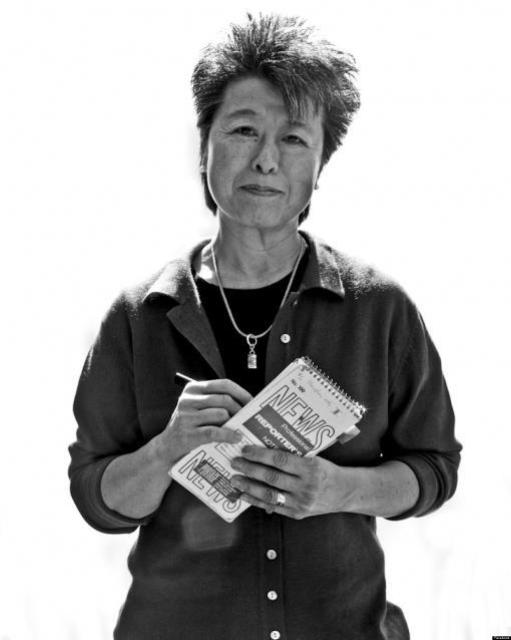
I could say that I love Helen Zia because her book, Asian American Dreams, opened my eyes to the importance of being not just Asian but Asian American, that we deserved an American history, too. I could say I love her because her investigative journalistic pieces have moved people and made impacts, changed the way we think about the murder of Vincent Chin and altered the policies on dealing with date rape at the University of Michigan. I could say that I love her because, as an out feminist and lesbian, she is a role model for me. I love her most of all, though, for her testimony against Proposition 8 in 2008: she spoke for the plaintiffs in Perry v. Schwarzenegger, saying that Prop 8 made a negative impact on her life as a queer married woman. Her testimony (read here by Patricia Clarkson) gives words to the inextricable language of family that marriage can give to queer people and especially queer people of color. It gives me the words I need to describe my relationship to other queer women, to my wife, to my family and to my identity as an Asian American. Zia has been an advocate for me, a role model for me, and a powerful force, giving me words for every feeling I didn’t know I had words for.
Janet Mock
by Mey
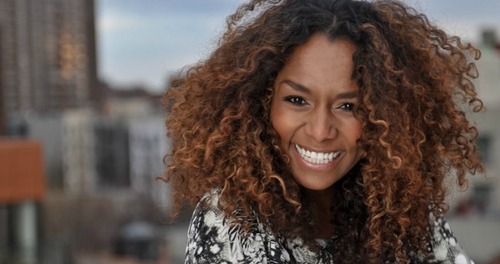
Janet Mock is at the very top of my “Queer Ladies I’d Like To Meet” list. It’s hard to talk about modern day trans activism in the US without talking about her. A former editor for People.com, she currently writes and speaks about trans issues and diversity at The Huffington Post, MSNBC, HLN, xojane, her own blog at janetmock.com and many other websites and public appearances. She is also the creator of the Twitter hashtag and campaign #girlslikeus, which focuses on bringing together and raising awareness about diverse trans women around the world.
Mock is often the go-to woman for news and opinion outlets when they need a trans representative. Even though I absolutely love to see her talk about trans issues, when she went on The Melissa Harris-Perry show back in April to talk about black women in media I was over the moon. She was allowed to be a full person with interests and a life and opinions on something other than gender, not just a woman whose only defining characteristic is her transness. No matter what she’s talking about, she speaks and writes with intelligence, elegance and a sense of realness that shows how dedicated she is to bringing trans women together. She is constantly reaching out to her community and her twitter feed is full of her building up and supporting her fellow trans women of color. She’s currently working on her memoir, Fish Food, which is due to come out February 2014. For a lot of people, Janet Mock might be the only trans woman of color they know, and as long as she stays as amazing as she is, I’m happy to have her in that role.
Marsha P. Johnson
by Mey
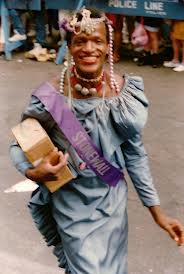
I see Marsha P. Johnson as a mother. But she’s not just a mother to trans women or women of color, she’s a mother to all queer people. According to eyewitnesses, Marsha P. Johnson was one of the first people to fight back against the police at the Stonewall Riots when she shouted “I got my civil rights!” and threw a shot glass into a mirror. Without her contributions, the gay rights movement as we know it might not have even started. She was an entertainer, sex worker, activist and one of the first people fighting for trans rights in New York from the 1960s all the way up to her death in 1992. At a time when gender nonconforming folks were even more ostracized from the LGBT movement then they are today, she got together with Sylvia Rivera and helped create the Street Transvestite Action Revolutionaries, a group that took care of young drag queens and trans women living on the streets in New York. According to those who knew her, she was always happy to use her last three dollars to buy treats to cheer up hungry friends and strangers. Even though she was constantly under pressure to be fit in with “proper” gay society, she refused to be anyone other than herself. When she was face to face with a judge and he asked her what the “P” stood for she replied “Pay it no mind!” and was sent on her way. That alone makes her worthy of being on any list of badass qwocs. She truly is one of the patron saints of queer rights in the United States.
Sylvia Rivera
by Carmen
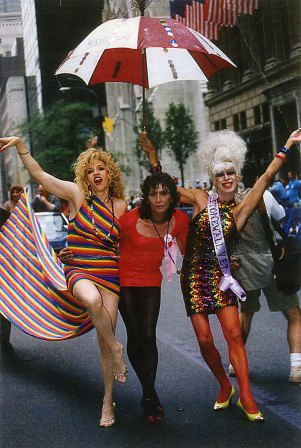
Sylvia Rivera grew up in New York, was Venezuelan and Puerto Rican and threw one of the first bottles at the Stonewall Riots. And I think that’s pretty badass, if you ask me.
Rivera became an activist at Stonewall, summing the entire situation up simply in an interview when she said, “you get tired of being just pushed around.” She went on to join the Gay Activists Alliance a year later, working hard to pass gay rights legislation in the city. But soon the GAA was no longer concerned with issues of “drag and transvestite concerns” and so she broke off, flipped them the bird and looked fabulous doing it – picking up the pieces when she co-founded Street Transvestite Action Revolutionaries, or STAR, with Marsha P. Johnson from right up there. She’d spent a lifetime on the streets, but when they came together to create something better for the trans* community of New York City she also had a home, living out her days in a STAR shelter. She spent the rest of her life immersed in and proving to be a valuable force for trans* rights. She is one of the activists who gave a name to the community, and then armed it to the teeth with an agenda and a kick in the ass.
I’m inspired by Rivera as sort of an act of activism. Her entire life was a profound movement. In 1998, she was interviewed by Worker’s World to describe herself “In Her Own Words,” What erupted was pure righteous fury and joy and the bittersweet feeling of being a part of a movement to make yourself a human in everyone’s eyes. Sylvia Rivera is proof of how long the fire inside lasts when you know you’ve got work to do. When you know this is something you have to do for yourself – and for the rest of the people you love.When you know you’re right, at all costs. And you’re not afraid to say it.
I’m glad I was in the Stonewall riot. I remember when someone threw a Molotov cocktail, I thought: “My god, the revolution is here. The revolution is finally here!”
I always believed that we would have a fight back. I just knew that we would fight back. I just didn’t know it would be that night.
I am proud of myself as being there that night. If I had lost that moment, I would have been kind of hurt because that’s when I saw the world change for me and my people.
Of course, we still got a long way ahead of us.
Wanda Sykes
by Brittani

When you think of Wanda Sykes, a few things probably come to mind. The foremost being that she is hilarious. What you probably don’t realize is what a trailblazer she is. Her accomplishments alone are tremendous but when you take into account that she’s a queer black woman of color, it’s almost unbelievable. Sykes had not one but two HBO stand-up specials, won an Emmy for her writing on The Chris Rock Show, has had various recurring television roles (Curb Your Enthusiasm, The New Adventures of Old Christine), appeared in several feature films (Monster-In-Law, My Super Ex-Girlfriend), does high-profile voice over work (Rio, Ice Age 4) and is a marriage equality activist. She also had her own late-night talk show which is the dudest, whitest type of TV in my opinion. Also Sykes was the first African-American woman and the first openly LGBT person to be the featured entertainer at the annual White House Correspondents’ Association dinner in 2009.
Sykes is an important queer woman of color because even before she was out, she took a stance. Material about gay rights have been a part of her act since the issue gained national prominence and she’s never backed down. A lot of times queer celebrities are scrutinized for either avoiding issues surrounding their identities or milking them for all they’re worth. I’ve never felt that Sykes has avoided conversations about her identity nor has she pandered to queers. She seamlessly weaves being gay and a person of color into her act in a personal yet relatable way which results in the most genuine but polished stand-up I’ve ever seen.




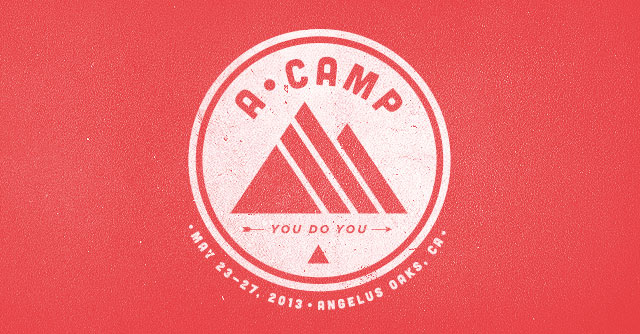




Comments
I am so in love with this list, both the inclusion of elders like Sylvia, Marsha, and Gloria and newer, younger folks that I now have to go find out about. ♥ ♥ ♥
Happiest of happy-making posts made by Autostraddle. I just want to hug this post and never let it go.
Also holy shit, Katrina that opening paragraph about the academy. That is my life at the moment.
This is fascinating. And I’m really happy to see that Wanda Sykes made the list.
This might be random but why is NO ONE talking about the show that’s about to premiere on abc family that features a family headed by an interracial lesbian couple, and it’s produced by J.Lo. It’s called “the fosters” and it starts on June 3.
They have:
http://develop.autostraddle.com/abc-familys-the-fosters-two-lovely-gay-ladies-bringing-up-four-very-lovely-kids-173398/
Oh, carry on then :)
Eeee, Lisa Bonet icon!
And I also want to hug/cuddle (huggle? :p) this post.
THE FEELS!!! It was the QWOC panel that convinced me I HAD to come to camp this year. I just want to hug all of you! (But only if you’re into that)
i was so excited to see a list like this! and while making a list like this would be extremely difficult verging on impossible considering how many amazing WoC are out there, and for the most part i think the selections are really thoughtful and have a good array of women from all kinds of backgrounds and fields, i’m really sad there isn’t a single indigenous woman on the entire list. why not Rigoberta Menchu or Winona LaDuke or any of the other amazing indigenous woman artists, activists, & leaders out there? surely they’ve each done enough to be admirable. and yes, while Gloria Anzaldua identified as indigenous, she also wrote a lot of things that were very hurtful and offensive to Native peoples and perpetrated a lot of lateral violence in her personal quest to reclaim her essentialized mestizaje-defined indigeneity. especially considering the list seems to be for the most part, US-centric, it’s kind of shocking to see a total absence of any Native or indigenous woman. how can we be left out of a list of amazing women on our own land?
was so excited to see a list like this! and while making a list like this would be extremely difficult verging on impossible considering how many amazing WoC are out there, and for the most part i think the selections are really thoughtful and have a good array of women from all kinds of backgrounds and fields, i’m really sad there isn’t a single indigenous woman on the entire list. why not Rigoberta Menchu or Winona LaDuke or any of the other amazing indigenous woman artists, activists, & leaders out there? surely they’ve each done enough to be admirable. and yes, while Gloria Anzaldua identified as indigenous, she also wrote a lot of things that were very hurtful and offensive to Native peoples and perpetrated a lot of lateral violence in her personal quest to reclaim her essentialized mestizaje-defined indigeneity. especially considering the list seems to be for the most part, US-centric, it’s kind of shocking to see a total absence of any Native or indigenous woman. how can we be left out of a list of amazing women on our own land?
Amen amen amen. I was just going to say something but I’m glad I wasn’t the only one that noticed this.
I can see this list really, really tried to be inclusive, and I don’t want to be “That Person”, because I always hate That Person, but really? Susan fucking Allen, for one, is kicking ass right now.
First Nation people face a lack of representation I dare say no other group of our size can understand. Autostraddle is working hard as fuck at being inclusive for other, more vocal groups, and that’s great; but please don’t forget about us while you’re focusing so hard on that. I know you can’t please everybody, and again, I don’t want to be That Person, but STILL. Four Latinas, sixish black Americans, two Asian Americans…statistically, you’d think…
I’m just going to go ahead and apologize for my previous comment; I’m PMSing hardcore and FEELINGS.
Sorry, AS. I love you, Riese. You do shit so well. Wanda Sykes is a badass. That’s all.
do you really feel the need to apologize for a post tiptoeing around the exclusion of your own communities? like fine if you don’t feel that way anymore, that’s your business, but you don’t need to use a tired sexist trope on menstrual hormones making people irrational as a means to undermine not only your own feelings, but a fellow Native woman’s. my critique is valid and fair. there are all sorts of Native women doing amazing things, and you’d think that one of us would get a token shout-out from a publication based on our own land, especially one that claims to be politically engaged re: issues of race. we are in the midst of a social movement, Idle No More, that has mobilized thousands of communities across several continents, that was sparked by four Native women–why aren’t they on this list?! and again–where’s Rigoberta Menchu, who is STILL outspoken on justice for survivors of the Guatemalan genocide, even in the midst of a heated trial in her own country? or Winona LaDuke, who has run for Vice President, created her own organization that does amazing work in tribal communities (Honor the Earth), and testified for the UN at the age of 18?! or if you’re looking for people less-known and younger, what about the founders of the Save Wiyabi Project, who do incredible work campaigning against violence against Native women? There are literally thousands of Native women that could’ve been selected to honor on here. The fact that none are mentioned is a great example of the continued effects of settler colonialism–privilege within that system can blind people to even remembering that we exist, much less are doing amazing things in our communities. we’re not a token Amnesty International campaign or a casual 1 in 3 statistic, we’re powerful women that deserve respect and recognition.
Oh, I didn’t mean to negate what you had said. I just think that maybe the way I said what I said wasn’t the best? I don’t know.
I know Riese truly takes to heart criticisms about AS, and I think that’s pretty great, and I know that AS tries. But I struggle with raising hell about something, and then AS trying to make up for it and be inclusive, and then overcompensating, which turns AS into something that it’s not, really, and has nothing to do with 98% of AS readers.
I’m a huge supporter of Idle No More; I’ve brought it up in the comments of previous pieces. I’m a huge supporter of my people in general (I’m Eastern Band Cherokee, but I also have Pokagon Potawatomi and Mexican Pima heritage). I think we’ve been silenced for too long. Forgotten, shut away to become artifacts in the minds of non-FN peoples. Representation of First Nation people isn’t a thing. I mean, the upcoming Lone Ranger reminds us of that.
Someone told me that Kate was First Nation, but I don’t know if it’s the all too common narrative (unfounded family legend), or it Kate’s enrolled. Maybe Kate could write something if Kate’s actually First Nation? I don’t know.
But truly, PMS does a number on my self-control. Also, people have just been incredibly accusatory on AS today, and that whole thing with Benson on SVU (ha. I wish I was kidding.), so I’m a little sensitive.
For what it’s worth, I don’t think you come off as “that person” at all. It’s a really valid point, PMS regardless. I think this list is great (yeah Andrea Hairston!!!), but I would love to see an article on AS featuring inspiring and admirable Native & indigenous women.
I’m kind of sad that you apologized for this comment, because I think it’s dead on.
The lack of FNMI women on this list is really depressing. Especially since I’m pretty sure y’all are camping on traditional Serrano territory right now.
Food for thought. They could always make another list, like they usually do.
I’m so happy you said something! I just logged in to comment on the lack of Native women on this list. I don’t mean to criticize on autostraddle at all. AS is great and try incredibly hard to be conscious of Native things, but it’s difficult to do without any Native writers. I’ve brought up similar criticisms before, and the team has encouraged me to write Native, Queer things since I am a native and queer person. I’ve just been too lazy/ distracted with school.
But this list definitely needs winona laduke, Idle No More leaders, maybe Louise Erdrich. There are plenty of fantastic women of color who are native that could be on this list.
Susan Allen!
She’s a lesbian, Rosebud Sioux, and a Minnesota State Rep. She’s a kickass lady who does A LOT for various tribes in Minnesota and the surrounding area. She’s the very first FN lesbian to be elected to state legislator.
Does anyone know where the article by Helen Zia about U of M is? I really want to read it but can’t seem to find it anywhere.
thank you so much for a great article of a few women out there who inspire us…..even though I am white I always call myself a Mexican girl…because I grew up there during my teenage and university years ….and later came back to USA and now am in Canada…..I grew to love the warm and extremely proud people who revere their history and are super tolerant of everyone….Autostraddle educates many and I learn from you all the time…!
You know that feeling when you’re always on the verge of tears when you have PMS? I watch Wanda’s vids and poof! I’m feeling better already.
Thanks for posting this! I’ve always been an admirer of Gloria Anzaldua’s writing. She’s such an inspiration to me as a feminist, WOC, queer person, and writer.
Also, thanks for featuring trans women! I’m glad that this list shows twoc who are or were vibrant, strong, and passionate. Too often, even sympathetic accounts of twoc focus on the violence directed at us, the hardships we face, and never on our strength, creativity, fucking fabulousness, etc.
Wow.
New objective acquired: read Andrea Hairston. A break in status quo of always thinking there’s too few queer women sci-fi writers.
And one of the above cases i can’t help but feel will end tragically. Wish i had the starfleet to interfere.
Don’t want to get in the middle of who should be in the list or not, but Leslie Feinberg’s book Transgender Warriors quotes a two-spirit lesbian poet named Chrystos who is Menominee, connected to Leonard Peltier and sounds pretty great from some of their poetry I’ve read.
http://en.wikipedia.org/wiki/Chrystos
Yes, Janet Mock is a great spokesperson, a valuable role model and all around great woman, but she’s really only been out 2 years (since the article about her in Marie Claire). This isn’t her fault, but I sometimes worry certain trans women get bestowed instant leadership cred, multiple speaking engagements and appear on media because they’re “passable”, femme and gender normative looking which is falling into the same old nonsense. Still, I’m glad to see her get mainstream attention on CNN.
Here’s a link of Chrystos speaking at the 2011 Creating Change Conference: http://www.youtube.com/watch?v=vZcLj-caeOE
Yes! Everyone should be paying attention to Fallon Fox right now. She’s a total badass who is making history despite every asshole in the universe trying to destroy her. I get so pissed every time I see an article accusing her of being a man who beats up women. I just don’t get it.
I am hardening myself for moment when the inevitable happens. it happened with the 300, happens with exarchs and tactical dreads in w40k. Happens with all forms of elite warriors there have been and all there will be. It’s called attrition.